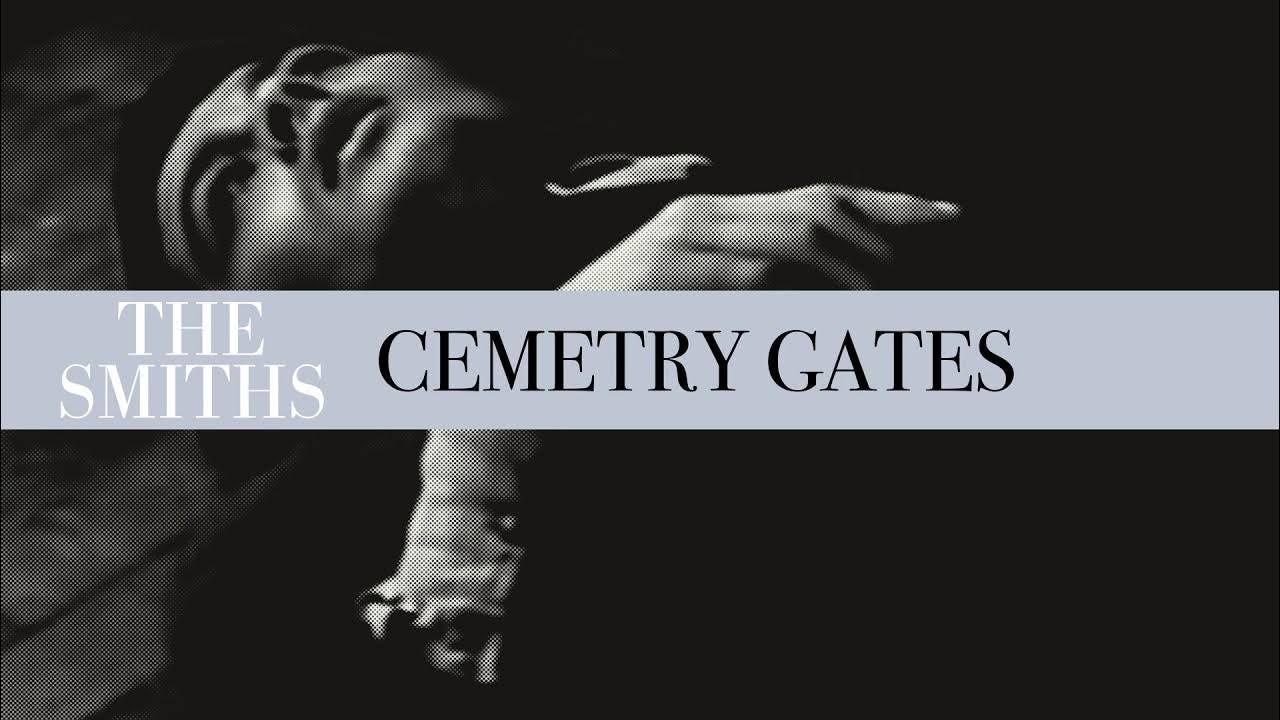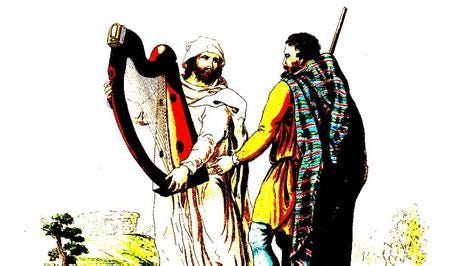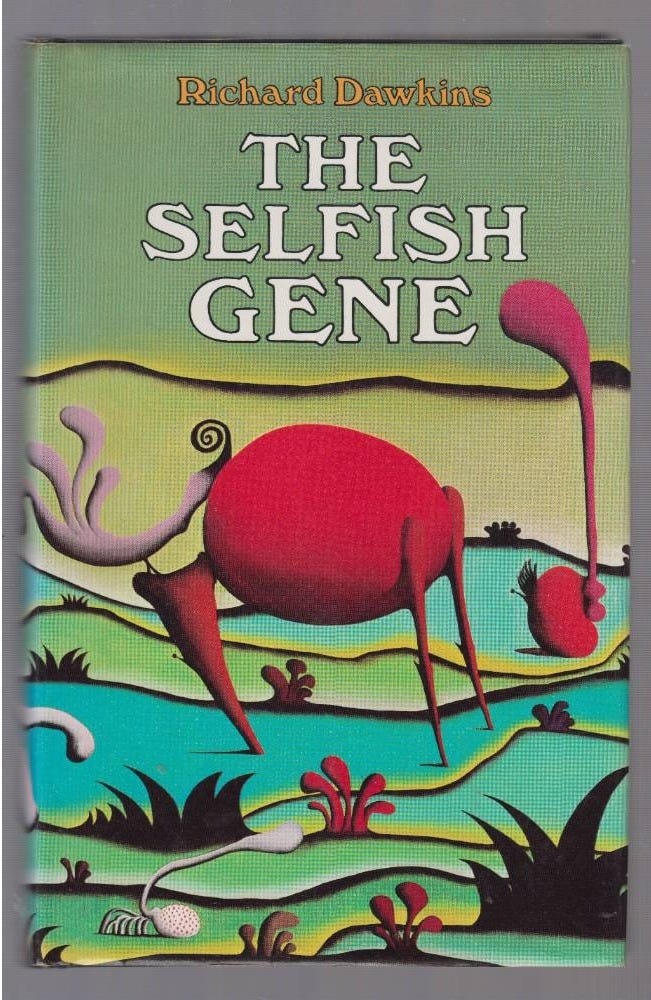
Simon Armitage, the current UK Poet Laureate, is the latest occupant of a post created in 1668, which signals that the UK still has a passing interest in culture2. However today in my view the real war of ideas are waged daily on the internet, in newspaper columns and magazines and television studios. Viral clips of politicians and celebrities, cat memes scroll endlessly across the mirror of public consciousness. But outside of a few Guardian readers, Simon Armitage’s latest poem seems unlikely to make much of an impact3.
Poets weren’t always this inconsequential in public life. In medieval Ireland every Gaelic chief worth his salt had a Filí (pronounced Fill-ee), his chief poet4. This was a cross between a professional sycophant/public relations officer, tabloid journalist, rapper, spin doctor, influencer, and genealogist. There was a strict hierarchy amongst the Filí, with the most important having the right to wear special clothes (a cloak of red feathers), and sit beside the King (as most major chiefs called themselves)5. Training was long and arduous, it could be as long as twelve years for the highest ranks, and English visitors to Ireland were astonished at the prestige and importance of professional poets in Irish society.
6The bedrock of this respect for professional wordsmiths in Irish society was the belief that the public persona and reputation of an individual or a patron was in the keeping of the professional Filí (or bard for the lower classes). In the King’s case, his reputation was crucial to his power and status; since the Irish system of tanistry7 meant that the heir to the kingship was not automatically the oldest son, but instead the one deemed the most worthy (usually the most ruthless because the job often included leading the clan in war), so the reputation-management job of the Filí was not always easy. Tanistry also meant that automatic deference to a King from the clan wasn’t guaranteed, so a compelling case had to be made by the Chief Spin Doctor (aka the Filí) that the incumbent chief/King was worthy of his role.
This usually involved a public recitation of the King’s genealogical pedigree, his prowess in battle, his wisdom in legal matters, his mercy to the poor and vulnerable, along with a large dollop of flattery on how handsome and rich he was. A King’s reputation was an important intangible asset, a legacy that could be passed down to future generations. A Filí often had to tread a fine line between flattery and credibility, particularly after the arrival of Christianity, in a society where inter tribal conflicts abounded; cattle raiding, rapine and tribal battles were common.
In a preliterate society, the main vehicle for disseminating good vibes about a chief and airbrushing his faults (and it was mainly, although not always, men), was through the medium of orally recited poetry which would be spread by bards or local storytellers. These had to be easy to remember, convey important information in an easily understood and transmissible way, and most importantly, entertaining. Successful poems could burnish both the reputation of a chief and poet alike, act as a form of community cohesion, entertain the masses through dark winter nights, and act as an effective public relations exercise through the generations and across the island.8
9Conversely, upsetting a poet, of any rank, was to invite a form of public shaming, destroying the reputation of both an individual and his descendants (and for evidence of the longevity of Irish grudges please see my previous post). One poet disgruntled by what he deemed to be inadequate hospitality by a patron composed a poem about a fairy king who because of his niggardly hospitality had been dethroned as unworthy of his high rank. His listeners would joined the dots, (whilst the poet retained the plausible deniability cover of ‘it was just a poem, dude’) listening to thinly veiled threats/curses in the lines:
Without food quickly on a dish,
Without cow’s milk on which a calf grows,
Without a man’s habitation after darkness remains,
Without paying a company of storytellers – let that be Bres’s condition 10
The slandered king in question had little recourse, chopping the poet’s head off might have given him temporary satisfaction, but by then the damage had already been done. The poem was out there in the wild, replicating and mutating at will, passed from person to person, across spatial and temporal divides, down the generations and across oceans from one human brain to another.
To Meme or Not to Meme
In his 1976 book ‘The Selfish Gene’ the writer Richard Dawkins coined the term ‘meme’ and defined it as:
a cultural feature or type of behavior that is passed from one generation to another without the influence of genes11
He also described memes as ‘mind viruses’, and in this context it is easy to see that traditional Irish society well understood the concept of memes in its cultural traditions, as a way of altering the consciousness of a listener and the dangers that it can pose :
A Limerick is furtive and mean. You should keep her in close quarantine: or she sneaks up to the slums: And promptly becomes. Disorderly, drunk and obscene.12
Once We Have Ink, it’s Real
Today, it is easy to see the present day equivalents of the Filí in the advertising industry, tabloid journalists and political spin doctors. I was reminded of this whilst reading a recent book called ‘All the Worse Humans’ by Phil Elwood (which I do not recommend if you are feeling pessimistic about the human condition) 13where he documents his methods of reputation laundering, keeping the frequently despicable misdeeds of corrupt dictators and governments out of the public spotlight in a way that any medieval poet tasked with writing a poem about his local warlord would have immediately understood. One sentence from the book struck me strongly:14
Once we have ink, it’s real
This is something the Irish Filí would have also understood, that ideas have their own agency, and once they are released into the public consciousness, they gain their own momentum. Here again the concept of memes is useful; the ability of poets to reifying ideas as words /images or songs in ways that makes them instantly transmissible to others was seen as a dangerous power in Irish society because they understood that once released into the public domain, these memes can achieve a life of their own and through the medium of human interactions, travel unhindered across time and space.
So believing that poets were the gatekeepers of these memes, the Irish weren’t wrong treat them with caution and pay them well. After all, it is better to keep Keats and Yeats on your side….
https://songmeanings.com/songs/view/35105/
https://www.britannica.com/topic/list-of-poets-laureate-of-Britain-1789231
https://poetrysociety.org.uk/news/a-new-simon-armitage-poem-to-mark-the-coronation/
https://en.wikipedia.org/wiki/Fil%C3%AD
https://www.connollycove.com/the-poets-of-ancient-ireland-ollamhs-and-fili/
There was also a lower order of Irish wordsmith, the bards, who churned out the bread and butter celebrations of marriage and funerals in the wider community or to lesser chiefs. These posts were often hereditary, with the post passing down through families (there are several Irish parishes called Ballymacward; translated as the place where poets live and the surname Ward indicates that the family is descended from a poet).
https://en.wikipedia.org/wiki/Tanistry
https://www.irishtimes.com/opinion/editorial/the-irish-times-view-on-the-place-of-poetry-how-to-pay-attention-1.4708371
https://www.maynoothuniversity.ie/research/spotlight-research/satire-and-medieval-irish-poetry
https://www.maynoothuniversity.ie/research/spotlight-research/satire-and-medieval-irish-poetry
https://richarddawkins.net/2014/02/whats-in-a-meme/
https://en.wikipedia.org/wiki/Limerick_(poetry)
https://www.nytimes.com/2024/06/29/books/review/all-the-worst-humans-phil-elwood.html
ibid.







A fantastic piece, and a fascinating parallel to todays’s memes indeed. I’ve been pondering the power of our words to create realities, and this is an apt example of that power and how it was feared.
We could all use a bit more healthy feat about the power of the tongue, I think, especially as it relates to our own words toward ourselves and others.
Thank you for writing in this!